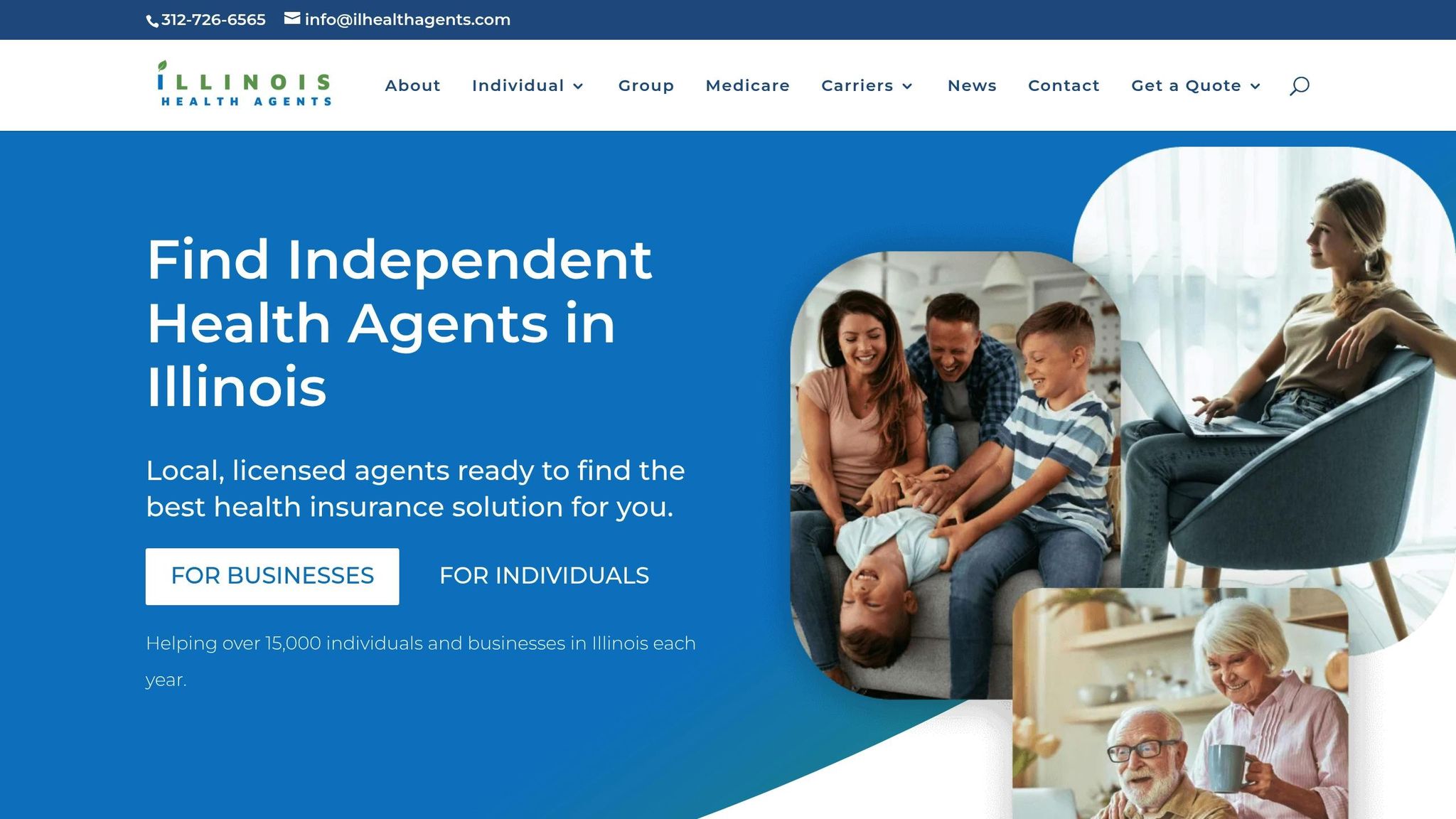HIPAA violations in Illinois can lead to severe financial penalties, legal actions, and reputational damage for organizations handling protected health information (PHI). Penalties range from $100 to $50,000 per violation, with annual caps of $1.5 million. Common violations include data breaches, delayed breach notifications, and failure to conduct risk assessments. Illinois also enforces state-specific privacy laws, adding another layer of compliance requirements.
Key takeaways:
- Frequent violations: Mishandling PHI, weak security, and breach notification delays.
- Examples: Advocate Health Care was fined $5.5M in 2016; Presence Health faced $475K in 2017 for delayed breach reporting.
- Penalty tiers: Fines increase based on negligence level, from unintentional errors to willful neglect.
- State laws: Illinois imposes additional penalties beyond federal HIPAA enforcement.
- Prevention: Regular risk assessments, staff training, secure systems, and timely breach reporting are critical.
Organizations must prioritize compliance to avoid fines, legal issues, and loss of trust.
What Are The Penalties For HIPAA Non-Compliance? – CountyOffice.org
HIPAA Penalty Tiers and Financial Impact
HIPAA penalties operate under a four-tier system that ties the severity of the violation to the financial consequences. Organizations that show genuine efforts to comply with regulations often face reduced penalties, while those demonstrating willful neglect or intentional violations are subject to much harsher outcomes.
Federal Penalty Tiers for HIPAA Violations
The Office for Civil Rights uses a tiered structure to determine penalties, taking into account the nature of the breach and the organization’s level of responsibility. Here’s a breakdown of the tiers:
- Tier 1: These violations occur when an organization is unaware of the breach, even after exercising reasonable diligence. These are often the result of honest mistakes or technical issues that were difficult to foresee or prevent.
- Tier 2: This tier applies when a violation happens due to a lack of adequate oversight. For example, many healthcare providers in Illinois find themselves in this category when gaps in training or monitoring lead to compliance failures.
- Tier 3: Willful neglect that is promptly addressed after discovery falls under this tier. Organizations that take immediate corrective action may face reduced penalties compared to those that delay or ignore the issue.
- Tier 4: The most severe violations involve systemic failures and result in substantial financial penalties. For healthcare providers and insurance brokers in Illinois, even a single Tier 4 violation can have devastating financial consequences, highlighting the critical need for robust compliance measures.
These tiers not only determine fines but also emphasize the broader legal and financial risks tied to HIPAA violations, which in extreme cases can escalate to criminal penalties.
Financial and Criminal Penalties
HIPAA violations don’t just result in civil fines – they can also lead to criminal charges if intentional misconduct or malicious intent is involved. Criminal penalties can range from significant fines to imprisonment, depending on the nature and intent of the offense. For instance, lesser offenses might involve unauthorized access or accidental disclosure of protected health information, while more serious cases – such as using sensitive data for personal gain – carry much harsher consequences.
The financial fallout from violations goes beyond fines. Organizations often face steep legal fees, investigative costs, and the need for expensive system upgrades to address vulnerabilities. On top of that, breaches can severely damage an organization’s reputation. For healthcare providers and insurance professionals in Illinois, investing in strong compliance programs and ongoing staff training is essential to reduce both financial exposure and reputational harm. These efforts are crucial to navigating the high stakes of HIPAA compliance.
HIPAA Penalty Examples in Illinois
Healthcare organizations in Illinois have faced steep penalties for failing to meet HIPAA requirements. These cases highlight the financial risks of non-compliance and serve as cautionary tales for healthcare providers and insurance professionals in the state.
Major Enforcement Cases in Illinois
Advocate Health Care received a hefty $5,550,000 fine in August 2016 due to its failure to conduct a thorough risk assessment.
Presence Health was penalized $475,000 in January 2017 for breaching the HIPAA Breach Notification Rule. The organization discovered that documents containing the medical records of 836 patients were lost on October 22, 2013. However, they delayed reporting the breach until January 31, 2014 – well beyond the 60-day reporting deadline.
In a more recent case, Health Fitness Corporation, an Illinois-based business associate providing wellness programs, settled for $227,816 in March 2025. This violation stemmed from a misconfigured server that exposed protected health information (PHI) online for nearly three years, from August 2015 to July 2018. Although fewer than 4,304 individuals were affected, the organization only completed a HIPAA-compliant risk analysis by January 19, 2024. This delay significantly contributed to their penalty.
These cases underscore the Office for Civil Rights’ (OCR) commitment to enforcing HIPAA regulations. As OCR Director Jocelyn Samuels explained:
"While OCR prefers to resolve issues through voluntary compliance, […] we will take the steps necessary, including litigation, to obtain adequate remedies for violations of the HIPAA Rules."
Common HIPAA Violations in Illinois
The patterns in these enforcement actions reveal recurring issues that organizations in Illinois must address:
- Risk assessment failures: Both Advocate Health Care and Health Fitness Corporation neglected to conduct timely and comprehensive risk analyses.
- Breach notification delays: Presence Health’s delay in reporting its breach beyond the 60-day window led to significant penalties.
- System configuration errors: Misconfigured servers, like the one involved in the Health Fitness Corporation case, can leave PHI exposed for extended periods, inviting regulatory action.
- Inadequate safeguards: Weak access controls, outdated privacy policies, and insufficient staff training were contributing factors in cases like Advocate Health Care’s.
For healthcare providers and insurance professionals in Illinois, these examples emphasize the need for proactive compliance. Conducting regular risk assessments, adhering to breach reporting timelines, ensuring secure system configurations, and investing in staff training are critical steps to avoid costly violations.
State-Level Enforcement and Additional Consequences
While federal enforcement often grabs the spotlight, state-level penalties can significantly impact organizations in Illinois. Understanding these additional layers of enforcement is crucial, as they amplify the risks tied to non-compliance.
Illinois State-Specific Laws and Penalties
In Illinois, state authorities have the power to impose penalties that go beyond federal actions. For instance, under the HITECH Act, State Attorneys General can pursue civil penalties for HIPAA violations if an Illinois resident is harmed by the breach. This means organizations could face both federal penalties from the Office for Civil Rights (OCR) and separate state-level actions for the same incident.
On top of that, Illinois residents affected by privacy violations may now pursue legal remedies for negligence under state privacy laws. The Federal Trade Commission (FTC) can also step in under its Health Breach Notification Rule to penalize organizations that aren’t covered by HIPAA but experience a data breach. These overlapping enforcement mechanisms make it clear that Illinois organizations operate under intense scrutiny.
Consequences Beyond Financial Penalties
Financial penalties are just the tip of the iceberg when it comes to the fallout from a HIPAA violation. As Emtrain puts it, "A HIPAA violation can erode patient trust and harm a healthcare provider’s standing in the industry". Beyond regulatory fines, organizations may also face hefty legal fees from lawsuits and settlements, further straining their resources.
The costs don’t stop there. Addressing a data breach often involves extensive investigations, audits, and IT system upgrades, all of which can be financially and operationally draining. Employees implicated in violations could face disciplinary actions, termination, or even criminal charges. In Illinois, there’s been a notable increase in the use of state laws to penalize employees who improperly disclose protected health information, particularly via social media.
These wide-ranging consequences emphasize the importance of proactive HIPAA compliance. The combined costs of federal fines, state penalties, legal battles, remediation efforts, and lost business can be overwhelming. For Illinois organizations, investing in robust HIPAA compliance programs isn’t just a regulatory requirement – it’s a critical safeguard for their reputation and long-term viability.
sbb-itb-a729c26
How to Avoid HIPAA Violations
The risks of HIPAA violations – both financial and operational – are too significant for Illinois healthcare organizations and insurance providers to ignore. To stay compliant, it’s essential to adopt a well-rounded compliance program that addresses both technical and administrative safeguards. Below are some practical steps to help bolster your HIPAA compliance efforts.
Compliance Best Practices
- Conduct Regular Risk Assessments: These are the backbone of HIPAA compliance. Regularly evaluate how your organization handles data, identify vulnerabilities, and document risks to Protected Health Information (PHI). Perform these assessments at least once a year, and always after introducing new systems or making significant operational changes.
- Employee Training Programs: Provide role-specific training that covers PHI handling, secure communication methods, and social media use. Keep these sessions documented, update them as needed, and reinforce the knowledge with periodic refresher courses.
- Access Controls and Authentication: Use tools like least privilege access, multi-factor authentication, regular password updates, and automatic session timeouts to limit unauthorized access to sensitive information.
- Business Associate Agreements (BAAs): If you work with third-party vendors that handle PHI, ensure they sign strong BAAs to safeguard data.
- Incident Response Plans: Establish clear protocols for identifying, containing, and reporting breaches. These plans should include the mandatory 60-day notification requirement and guidelines for coordinating with both federal and Illinois state authorities.
- Physical Safeguards: Implement measures like automatic screen locks, secure storage for paper records, and proper disposal methods for PHI to protect sensitive information.
How Illinois Health Agents Can Help

Expert guidance can make all the difference when it comes to avoiding costly HIPAA violations. Illinois Health Agents offers a range of services designed to complement your compliance strategies and simplify the process.
Their support includes educational resources, tailored insurance solutions, and streamlined benefits management systems that help reduce data handling errors. Annual review meetings keep clients informed about changes to HIPAA regulations and reinforce employee training programs.
- Plan Selection Assistance: Illinois Health Agents help organizations choose insurance plans that align with their compliance goals. They recommend carriers and plan structures that reduce administrative burdens while maintaining strict privacy protections. Their expertise in Health Savings Accounts (HSAs) is particularly helpful, as these accounts come with unique privacy considerations for employers.
Conclusion
HIPAA compliance in Illinois is far more than just checking a box – it’s a critical step in safeguarding patient privacy and ensuring financial security. The penalties for non-compliance are steep, with civil fines ranging from $100 to $50,000 per violation and annual penalties capped at $1.5 million. On top of that, willful violations can lead to criminal charges, including fines and even imprisonment. These consequences highlight the serious risks of failing to meet HIPAA standards [7,10].
The good news? Most HIPAA violations can be avoided. Common issues, such as incomplete risk assessments, delays in breach notifications, and overlooked patient access or business associate agreements, are often the root cause of non-compliance. The HIPAA Security Rule, with its 18 standards and 42 implementation specifications, underscores the complexity of maintaining compliance.
For businesses in Illinois that handle protected health information, implementing strong administrative, physical, and technical safeguards is a must. This requires ongoing updates and rigorous measures to ensure data security. Partnering with experts like Illinois Health Agents can make a significant difference. They provide educational resources and tailored benefits management systems to reduce errors in handling sensitive data. Their annual review meetings keep clients informed about regulatory updates and reinforce training programs, adding an extra layer of protection against costly mistakes.
Investing in proactive compliance today can save businesses from the financial, operational, and reputational fallout of violations down the road.
FAQs
What are the most common types of HIPAA violations in Illinois healthcare organizations?
Some of the most frequent HIPAA violations seen in Illinois healthcare organizations include:
- Unauthorized access to patient records: Commonly called "snooping", this happens when staff members view medical records without a valid reason or authorization.
- Failure to conduct risk assessments: Skipping thorough risk evaluations leaves organizations more susceptible to data breaches and compliance failures.
- Improper disposal of medical records: Tossing out paper or electronic records without following HIPAA protocols can expose sensitive patient data.
- Loss or theft of unencrypted devices: Losing laptops, USB drives, or other devices that store protected health information (PHI) can lead to compliance issues and potential data breaches.
These violations don’t just bring hefty fines and legal troubles – they can also severely damage an organization’s reputation. Adhering to HIPAA regulations is critical to safeguarding patient privacy and maintaining trust.
How do Illinois privacy laws impact organizations managing protected health information (PHI)?
Illinois Privacy Laws and Their Impact on Health Information
Illinois takes privacy a step further than federal HIPAA regulations by imposing additional rules for handling protected health information (PHI). These state-specific laws aren’t just about aligning with HIPAA – they often go beyond it. For instance, Illinois requires that both physical and electronic health records be securely disposed of to ensure patient confidentiality. This means shredding paper documents and permanently deleting digital files in a way that makes recovery impossible.
Beyond disposal, organizations in Illinois must regularly conduct self-audits and adopt stricter privacy protocols when state laws provide more robust protections than federal guidelines. These measures aren’t just about staying compliant – they help organizations avoid penalties while ensuring they meet both state and federal standards.
How can healthcare providers in Illinois reduce the risk of HIPAA violations and avoid penalties?
Healthcare providers in Illinois can take practical steps to lower the risk of HIPAA violations and protect patient information. Start by ensuring all staff members receive comprehensive HIPAA training, emphasizing the importance of safeguarding protected health information (PHI). Ongoing education is key to reinforcing compliance and keeping everyone up to date with changing regulations.
Strengthening access controls is another critical step. Limit access to sensitive data strictly to those who need it, and use tools like encryption and strong passwords to block unauthorized access. Regularly reviewing security measures and conducting audits can help spot vulnerabilities early, reducing the chances of a breach.
Creating a workplace culture that values accountability and privacy can also have a big impact. When compliance is prioritized and concerns are addressed quickly, healthcare providers are better equipped to protect patient data and steer clear of hefty penalties.



0 Comments